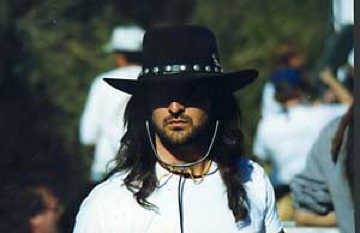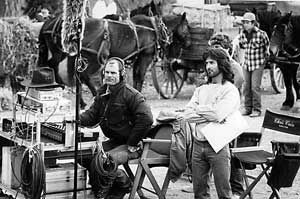JW: You are an accomplished martial artist. You hold a black sash ranking in Shaolin Kung Fu, an accomplishment that took over a decade in training. You’ve studied several other systems around the world, and the first thing you do when traveling is seek out the martial arts community. What is it about that culture and their traditions and heroes that has had such a profound influence on your life and work?

JF: In the martial arts there is the scholar-warrior tradition which I greatly admire and adhere to in my own life. In that tradition you practice martial arts, horsemanship, music, language… it’s a tradition of training and bettering yourself. There is a mind/body/spirit polishing that keeps the whole machine firing at a high level. It comes down to a personal code of discipline. That philosophy is how I live my life and I’m drawn to characters who follow a similar code. I’m fascinated by the idea of the poet-warrior.
JW: It seems counter-intuitive that rigorous discipline would align with your work as an artist.
JF: It’s an interesting dichotomy and it calls to mind Bruce Lee’s philosophy. He created a martial arts system called Jeet Kune Do which I’ve been practicing and it’s all about finding the ‘formless form’. His philosophy is that you practice classical martial arts for many years and through that discipline you get your skills to the highest level and then free yourself from styles, patterns, and modes. Lee said it’s like ice dissolving in water. When one has no form, one can be all forms. When one has no style, one can fit in with any style. In terms of reconciling discipline with creativity, I liken it to transitioning from classical piano scales to free-form jazz. The idea is that because you’ve trained yourself at the highest level and you have command of that vernacular, you can now be more creative. That discipline allows you freedom. I apply that to my writing as well.
JW: Is that discipline and focus what has allowed you to take on such a staggering number of projects at once?
JF: One of the main things I like to communicate to aspiring writers is that it comes down to daily discipline and commitment. Every day, I start writing before 5am. For the last 28 years, I’ve been up at 4:45 and I attack the project at hand. If I’m working on multiple projects at once, I’ll block out the day. I keep endless lists that are always shape-shifting and evolving but I always have the day organized. I like to take advantage of the early mornings because the muse is really kicking at that time. It allows you to roll over from the dream state into the creative work. You’re not censoring, you’re not editing, it’s a free-flow time. If I’m working on a re-write of something, I’ll generally do that later in the day, but if it’s a fresh, new original, I use those morning hours.
At 11am I begin my martial arts training. My training is often tailored to reflect what I’m writing and take me deeper into the material. If I’m working on multiple projects and need to switch gears during the day, I’ll use some kind of ritual to take me into that world. For instance, if I’m transitioning from the Wudang sword forms of the Crouching Tiger sequel over to Last Train to Memphis, my young Elvis movie, that’s when I’ll go practice my music studies and maybe put on my vintage Sun Records or read a few chapters from the book it’s based on.
[/col_5] [col_5]It’s a method shift to allow me to get in touch with that part of myself that will allow me to do my best, deepest work on that subject.
I usually earmark my afternoons for keeping up the business end of the projects. I have a list that right now includes eleven projects that are alive and going as well as a novel that just sold to Simon and Schuster. Each requires a daily phone call or some kind of action that will keep them moving forward and will them into existence. It’s that focus and discipline that allows you to seize opportunities as they come.
JW: So much of who we are as people and what we believe to be true of ourselves and our society is shaped by the stories we tell. How do you view your place in that conversation and what responsibility does that bear?
JF: I’m really interested in how cultures cast their own identity and make sense of their histories, triumphs and tragedies through storytelling. I had the great honor of working with traditional Native American storytellers and medicine elders in representing their stories as a mini-series for ABC. These are people that hold the view that a story will lose it’s power if any aspect of it is changed as it is passed on. So I had the challenge of being faithful to their account while translating the narrative for television. That said, as a screenwriter and novelist, I never set out with this idea of burden or responsibility. No one has elected me to be the tribal storyteller or chronicler of history and culture. I’m more like a wandering storyteller, writing about the things that fascinate me, the things that make me angry, the things I’m passionate about, but when a story works it’s because it connects on some universal level. So telling stories through the farthest reaching medium on earth does carry responsibility, there’s no question, but I’m confident that if I’m true to my personal values and sense of justice, then I’m being a responsible storyteller. That’s the compass I use with everything I write.

JW: By any measure you’ve been wildly successful. I’m sure you could attribute that to many things, but tell me about your relationship with your wife and the role she has played in your journey.
JF: When we met I was a high school drop out with a GED, making hand grenade clips at a munitions factory in Connecticut by day and going to night school at a small community college. Richela and I were in the stage society together and I knew from the first that we were kindred spirits. We were creative people that had grown up in a community that was not kind to dreamers, the kind of place that didn’t want to see anyone break away. She was an accomplished martial artist and we had shared interests in Native American culture, eastern philosophy and tribal culture, but I think the greatest common denominator was that we believed. We believed that we could go off and live our personal legends as Paulo describes such callings in The Alchemist. There was something incredible about finding a true partner in that quest. We went off to the big city and NYU together and we’ve been together ever since, now married 28 years, and we support each other at every turn. I can tell you, it just gets better and better. The key is finding someone who respects your personal calling, or better yet — is an integral part of it.
[/col_5] [/row]Interview by: Jeremy Wheeler | Images provided by: John Fusco
